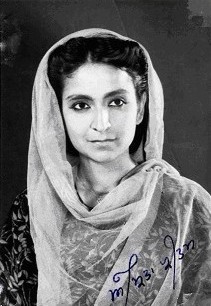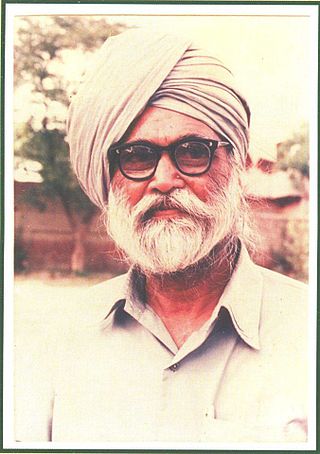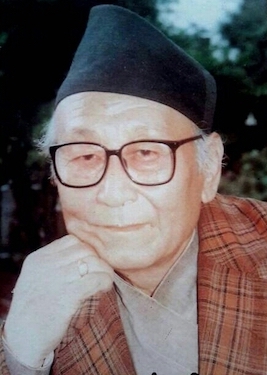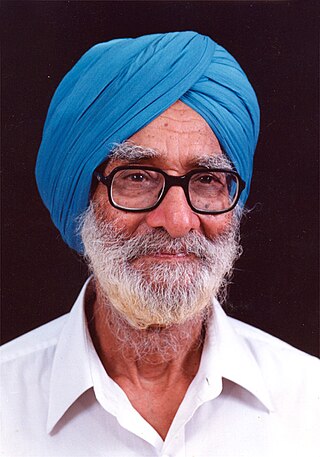Related Research Articles

Amrita Pritam was an Indian novelist, essayist and poet, who wrote in Punjabi and Hindi. A prominent figure in Punjabi literature, she is the recipient of the 1956 Sahitya Akademi Award. Her body of work comprised over 100 books of poetry, fiction, biographies, essays, a collection of Punjabi folk songs and an autobiography that were all translated into several Indian and foreign languages.

Kartar Singh Duggal was an Indian writer who wrote in Punjabi, Urdu, Hindi, and English. His works include short stories, novels, dramas and plays. His works have been translated into Indian and foreign languages. He has served as director of the All India Radio.

Harbhajan Singh was an Indian poet, critic, cultural commentator, and translator in the Punjabi-language. Along with Amrita Pritam, Harbhajan is credited with revolutionising the Punjabi poetry writing style. He published 17 collections of poems, including Registan Vich Lakarhara, 19 works of literary history and translated 14 pieces of literature of others including those of Aristotle, Sophocles, Rabindranath Tagore and selections from the Rig Veda.

The Sahitya Akademi Award is a literary honour in India, which the Sahitya Akademi, India's National Academy of Letters, annually confers on writers of the most outstanding books of literary merit published in any of the 22 languages of the 8th Schedule to the Indian constitution as well as in English and Rajasthani language.
The Sahitya Akademi Fellowship is a literary honour in India bestowed by the Sahitya Akademi, India's National Academy of Letters. It is the highest honour conferred by the Akademi on a living writer, the number of fellows at no time exceeding 21. Elected from among writers thought by the Akademi to be of acknowledged merit, the fellows are sometimes described as the "immortals of Indian literature."

Navtej Singh Sarna is an Indian author-columnist, diplomat and former Indian Ambassador to the United States. He previously served as the High Commissioner of India to the United Kingdom, and the Ambassador to Israel.

Rana Nayar is a translator of poetry and short fiction from Punjabi to English. He has more than forty volumes of poetry and translation works to his credit. He is also a theatre artist and has participated in a number of major full-length productions. He won Sahitya Akademi Golden Jubilee prize for his English translation of the Punjabi devotional poetry of Saint Baba Farid.
Punjabi literature, specifically literary works written in the Punjabi language, is characteristic of the historical Punjab of India and Pakistan and the Punjabi diaspora. The Punjabi language is written in several scripts, of which the Shahmukhi and Gurmukhī scripts are the most commonly used in Pakistan and India, respectively.
Gurdial Singh Rahi was an Indian writer and novelist who wrote in Punjabi. He started his literary career in 1957 with a short story, "Bhaganwale." He became known as a novelist when he published the novel Marhi Da Deeva in 1964. The novel was later adapted into the Punjabi film Marhi Da Deeva in 1989, directed by Surinder Singh. His novel Anhe Ghore Da Daan was also made into a film of the same name in 2011 by director Gurvinder Singh. Singh was honoured with the Padma Shri in 1998 and Jnanpith Award in 1999.

Gulzar Singh Sandhu is a prominent Punjabi language writer. He won the prestigious Sahitya Akademi Award, given by the Sahitya Akademi, India's National Academy of Letters, for his short story collection, Amar Katha in 1982. Among other awards he was also the recipient of International Association of Authors, Playwrights and Artists of Canada in 1992 and Shiromani Punjabi Sahityakar Puraskar from the Education Department of Punjab in 2001.

Sant Singh Sekhon (1908–1997) was an Indian playwright and fiction writer associated with Punjabi literature. He is part of the generation of Indian authors who mark the transition of India into an independent nation, scarred by the tragedies of partition.
Ram Sarup Ankhi was an Indian writer, poet, and novelist who wrote in Punjabi. He started as a poet but ended up as a fiction writer. He was awarded the Sahitya Akademi Award by the Sahitya Akademi, India's National Academy of Letters in 1987 for his novel Kothe Kharak Singh.

Sujan Singh was a story writer of Punjab, India.
Waryam Singh Sandhu is an Indian author of short stories. In 2000, he was awarded the Sahitya Akademi Award for his short story collection Chauthi koot. Although he writes in Punjabi, his works have been translated into Hindi, Bengali, Urdu and English.

Baldev Singh, also known as Baldev Singh Sadaknaama, is an Indian novelist and story writer in Punjabi-language. He received the Sahitya Akademi Award 2011 for his novel Dhahwan Dilli De Kingre. As of 2012, he has written 55 novels and various short stories and plays.

Shiva Kumar Rai (1919-1995) was a Nepali language writer and politician from Darjeeling, India. He won the Sahitya Akademi Award in 1978 for his collection of short stories Khaharey. He was the first Gorkha minister in the state of West Bengal after becoming a deputy minister in 1952.
Rawail Singh is Professor of Punjabi at Delhi University. Member University Court and Member of Standing Committee of Delhi University. He is also Convenor of Punjabi Advisory Board of Sahitya Akademi, the National Academy of Letters. Besides he is on board of a number of national and international bodies, he has participated and contributed a lot to many of the literary and cultural events in India and abroad. Earlier, he was Secretary to Punjabi Academy, Government of Delhi for 14 years. He is also a renowned broadcaster. As Secretary, Punjabi Academy, he was instrumental to bring Punjabi literature, art and culture to centre stage.
He has authored a number of books in Punjabi Literature. As Editor of Peer journal " SAMDARSHI" in Punjabi he is experimenting with a number of subjects. His area of specialization is Punjabi Drama and Media Studies in Punjabi which is a rare combination.

Dr. Harcharan Singh (1914–2006) was an Indian dramatist and writer in the Punjabi language. He dedicated 69 years of his life to Punjabi theater, in which he authored 51 books and staged numerous plays all over the world.
Narenderpal Singh or Narinder Pal Singh was an Indian novelist who wrote in Punjabi. He was awarded the Sahitya Akademi Award in 1976 for his book Baa Mulahaza Hoshiar by the Government of India.
Atamjit Singh is a Sahitya Akademi Award winning Punjabi playwright. He returned his Sahitya Akademi Award in October 2015. Singh is a part of the Dakshinayan Abhiyan.
References
- ↑ "Mohinder Singh Sarna". Rupa Publications. Retrieved 31 July 2019.
- ↑ Ahmed, Abir; Raina, Rupal (8 January 2014). "Hope is alive". The Hindu. Retrieved 28 December 2018.
- ↑ Inheritors of a new age. OCLC 61446080 . Retrieved 14 July 2016– via worldcat.org.
- ↑ "AKADEMI AWARDS 1994". sahitya-akademi.gov.in. Archived from the original on 4 March 2016. Retrieved 14 July 2016.